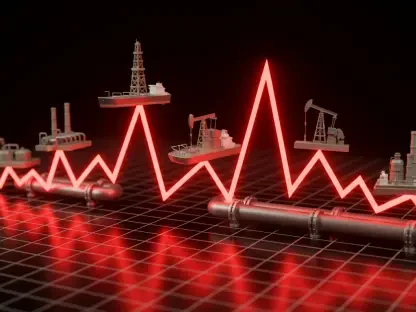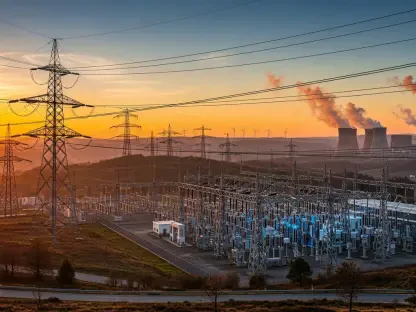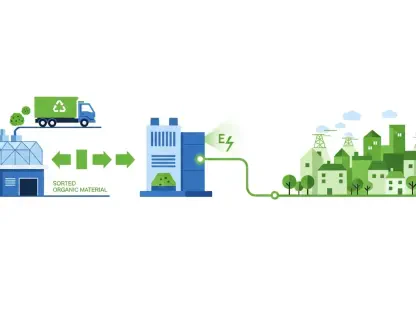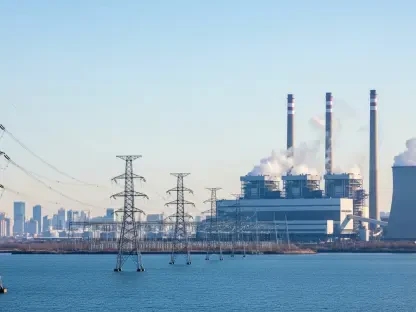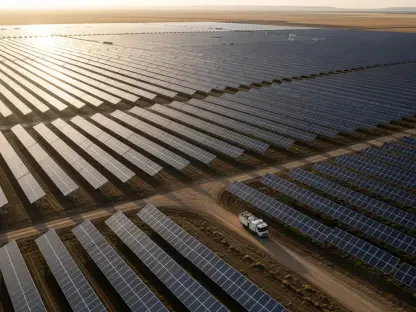The financial closure of a groundbreaking greenfield anaerobic digestion plant in Deeside, situated on the England-Wales border, marks a significant milestone in renewable energy efforts. Spearheaded by abrdn Global Sustainable Infrastructure Partners IV LP (aGSIP) and The Circular Economy Development Ltd (TCED), this ambitious project aims to transform food waste into biogas, while also playing a pivotal role in reducing CO2 emissions. Set to contribute substantially to renewable energy production and environmental sustainability, the project exemplifies the integration of advanced technology in achieving these objectives.
Transforming Food Waste into Valuable Biogas
Project Overview and Technological Specifications
Involving a comprehensive suite of activities, the Deeside anaerobic digestion plant will be designed, built, owned, operated, maintained, and financed by the project stakeholders. Scheduled to begin construction in the third quarter of 2024, the facility is expected to commence commercial operations by late 2026. Equipped to process approximately 120,000 tons of food waste annually, the anaerobic digestion plant will convert this waste into biogas using state-of-the-art digestion technologies. These technologies break down organic matter in the absence of oxygen, producing biogas—a mixture primarily composed of methane and carbon dioxide—alongside digestate, a nutrient-rich byproduct.
Once produced, the biogas will undergo an upgrading process to separate its components. About 180 MWh of high-purity biomethane will be extracted and subsequently injected into the national gas grid. Additionally, the captured CO2 will not be wasted; it will be purified, liquefied, and marketed for various industrial applications. Moreover, a fraction of the extracted biomethane will fuel a combined heat and power (CHP) unit, generating an estimated 5 MW of green electricity. This multifaceted approach aims to maximize the utility of generated biogas, thus enhancing the project’s overall efficiency and impact on renewable energy generation.
Key Benefits and Environmental Impact
One of the primary objectives of the Deeside project is to mitigate climate change by substantially reducing CO2 emissions and landfill waste. By processing a hefty 120,000 tons of food waste each year, the facility significantly curtails the amount of waste destined for landfills, thereby minimizing methane emissions associated with landfill decomposition. Converting this waste into biogas not only provides a renewable energy source but also contributes to a more circular economy, wherein waste materials are continuously repurposed rather than discarded.
Moreover, the project’s impact extends beyond mere waste conversion. The CO2 captured during the biogas upgrading process presents new opportunities for further decarbonization in various industries. Liquid CO2 can be employed in manufacturing processes, food storage, and even carbonated beverages, thereby reducing the need for freshly produced CO2 and contributing to overall emissions reduction. The integration of the combined heat and power unit further amplifies the environmental benefits, offering a dual solution of heat and electricity derived from renewable sources, which can be channeled back into the local grid. This strategy not only optimizes resource use but also underscores the project’s commitment to sustainable practices.
Industry Trends and Stakeholder Commitments
Alignment with Broader Industry Trends
The growing importance of sustainable and renewable energy projects in combating climate change was notably underscored by industry leaders involved in this project. Olivier Rossi, Director at abrdn, emphasized that the Deeside anaerobic digestion plant aligns perfectly with the company’s long-term investments in infrastructure that support energy transitions. Rossi remarked how these sustainable projects satisfy investor goals centered on environmental, social, and corporate governance (ESG) criteria, thereby meeting rising demand for responsible investment opportunities. This viewpoint is increasingly echoed across the industry, with many stakeholders acknowledging the urgency of addressing climate change through innovative renewable energy projects.
Further illustrating this commitment, TCED’s CEO, Mac Andrade, highlighted that the Deeside initiative represents a crucial step towards decarbonizing significant energy users. Andrade noted that the facility is not just a project but a pivotal move in their mission to build a more sustainable future. Both abrdn and TCED are evidently committed to bridging the gap between economic and ecological objectives, showing that sustainable projects can deliver robust financial returns while fostering environmental stewardship. This dual focus is reflective of broader industry trends where the integration of advanced technology and sustainability principles is increasingly viewed as essential to future growth and resilience.
Financial and Economic Implications
The investment exceeding £60 million in the Deeside anaerobic digestion facility underscores the financial commitment and belief in the project’s long-term viability. Both abrdn and TCED have identified the anaerobic digestion plant as a key component of their broader sustainability portfolios. By channeling substantial financial resources into the project, these companies are betting on the potential of advanced renewable technologies to provide consistent, long-term returns while also adhering to stringent environmental standards. This financial backing is not merely an investment in infrastructure but also a statement of intent to lead in the transition towards greener, more sustainable energy systems.
The Deeside project serves as a tangible example of how sustainable energy initiatives can be economically viable, fostering a productive interplay between ecological responsibility and financial performance. The successful execution and operation of this project could set a precedent for future investments in similar greenfield projects, encouraging more stakeholders to follow suit. By effectively converting waste into a valuable resource and reducing CO2 emissions, the project aims to deliver both economic and environmental dividends, reinforcing the notion that sustainability and profitability are not mutually exclusive but rather complementary forces in the modern energy landscape.
Concluding Thoughts
The financial closure of a pioneering greenfield anaerobic digestion plant in Deeside, located on the border between England and Wales, represents a major advancement in renewable energy initiatives. Led by abrdn Global Sustainable Infrastructure Partners IV LP (aGSIP) and The Circular Economy Development Ltd (TCED), this innovative project aims to convert food waste into biogas, significantly contributing to CO2 emissions reduction. The plant is poised to make a notable impact on renewable energy production and environmental sustainability. By embodying the synergy of cutting-edge technology and sustainable practices, the project demonstrates how advanced strategies can effectively address environmental challenges. Its implementation will not only boost green energy output but also serve as an exemplary model for future initiatives in the realm of renewable energy. This venture underscores the crucial role of modern technology and creative solutions in fostering a greener, more sustainable future, advancing the goals of both energy efficiency and environmental conservation.



